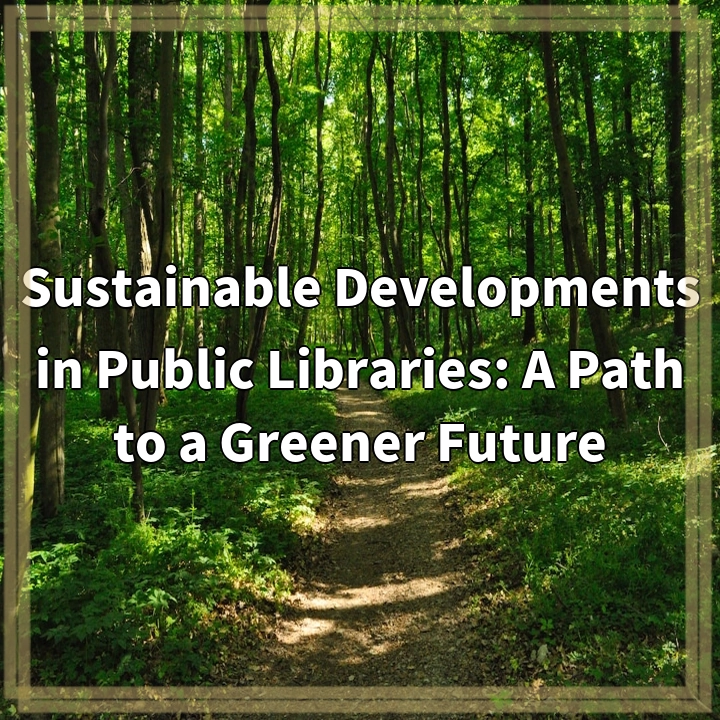
What is Sustainable Developments in Public Libraries?
Public libraries play a crucial role in promoting sustainable development within their communities. Sustainable developments in public libraries entail the implementation of eco-friendly practices and initiatives to minimize environmental impact and foster a greener future.
Real-World Problems Associated with Sustainable Developments in Public Libraries
Despite the importance of sustainable developments in public libraries, there are several challenges and obstacles that need to be overcome:
Limited Resources
Public libraries often face budget constraints and limited resources, making it challenging to invest in sustainable infrastructure and technologies. Lack of funding can restrict the implementation of energy-efficient systems, waste reduction programs, and renewable energy sources.
Infrastructure and Retrofitting
Many public libraries have aging infrastructure, which can pose challenges when trying to adopt sustainable practices. Retrofitting existing buildings to incorporate energy-efficient features, such as solar panels or insulation, may require significant financial investment and expertise.
Community Engagement
Sustainable developments in public libraries heavily rely on community engagement and participation. However, engaging community members and raising awareness about the importance of sustainable initiatives can be a hurdle. Lack of interest or knowledge about environmental issues may hinder support and active involvement.
Technological Advancements
The rapid advancement of technology poses both opportunities and challenges for sustainable developments in public libraries. While technological innovations can enhance energy efficiency and resource management, keeping up with the latest advancements and incorporating them into library operations can be demanding and costly.
Policy and Regulations
Public libraries operate within a larger policy and regulatory framework. In some cases, outdated policies or regulations may hinder the adoption of sustainable practices. Advocating for supportive policies and navigating complex regulations can be time-consuming and require collaboration with government entities and stakeholders.
In conclusion, sustainable developments in public libraries face several real-world problems, including limited resources, infrastructure challenges, community engagement, technological advancements, and policy and regulatory hurdles. However, by addressing these issues strategically and collaboratively, public libraries have the potential to make a significant impact in building a greener and more sustainable future for their communities.

Solutions for Sustainable Developments in Public Libraries
While there are challenges associated with sustainable developments in public libraries, there are also practical solutions that can help overcome these obstacles:
Securing Funding and Resources
Public libraries can explore various avenues to secure funding for sustainable initiatives. This can include applying for grants or seeking partnerships with local businesses or organizations that prioritize environmental sustainability. Additionally, libraries can allocate budget resources strategically to prioritize sustainability projects.
Gradual Infrastructure Improvements
Instead of undertaking large-scale retrofitting projects, libraries can adopt a phased approach to gradually improve their infrastructure. For example, they can start by upgrading lighting systems to energy-efficient LEDs or installing smart thermostats for better temperature control. This allows libraries to achieve sustainable improvements over time within their financial means.
Community Education and Engagement
Public libraries can organize workshops, seminars, and community events to raise awareness about sustainability and encourage active participation. By providing educational resources and promoting the benefits of sustainable practices, libraries can engage the community and foster a sense of environmental responsibility.
Strategic Technology Integration
Libraries can stay abreast of relevant technological advancements and selectively adopt solutions that align with their sustainability goals. This may include implementing energy management systems, utilizing cloud-based technologies to reduce paper consumption, or providing digital resources and services that minimize environmental impact.
Advocacy and Collaboration
Public libraries can work together with government entities, policymakers, and other stakeholders to advocate for supportive policies and regulations. By collaborating with local authorities and participating in sustainability networks, libraries can influence systemic change and create an enabling environment for sustainable developments.
In conclusion, by securing funding and resources, implementing gradual infrastructure improvements, promoting community education and engagement, strategically integrating technology, and advocating for supportive policies, public libraries can overcome the challenges associated with sustainable developments and make significant strides towards a greener future.















